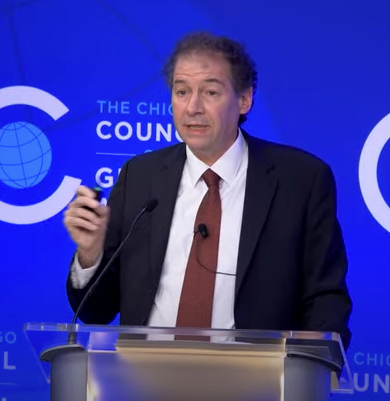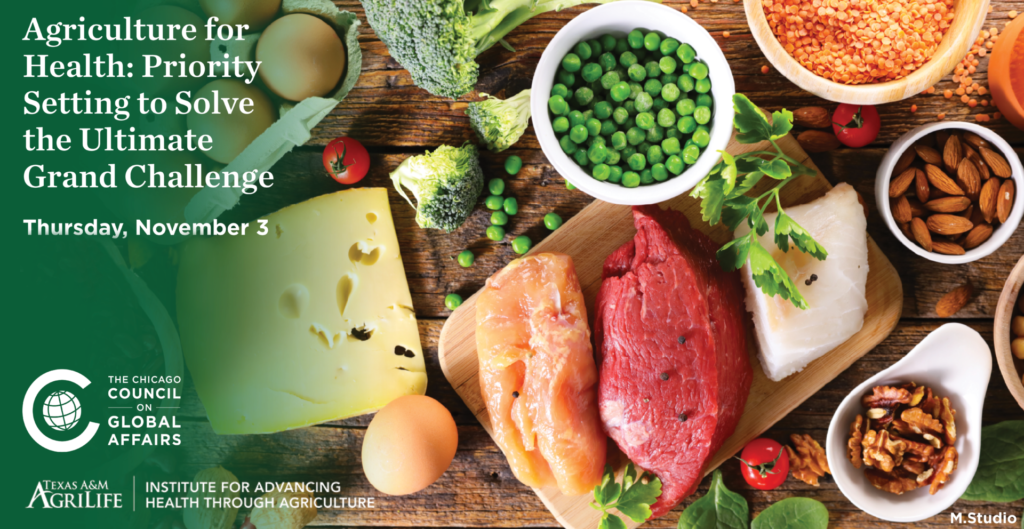Texas A&M leads national conference on agriculture for health
Institute for Advancing Health Through Agriculture, Chicago Council on Global Affairs bring together key agri-food chain stakeholders
The Texas A&M AgriLife Institute for Advancing Health Through Agriculture, IHA, laid out a path toward strengthening agriculture’s integral role in reducing chronic disease at a conference held in Chicago Nov 3.

The IHA partnered with the Chicago Council on Global Affairs to host a “Conference on Agriculture for Health: Priority Setting to Solve the Ultimate Grand Challenge.” The event drew experts from higher education, agriculture, government, and the private and nonprofit sectors.
Presenters included Patrick Stover, Ph.D., director of the IHA, and Chavonda Jacobs-Young, U.S. Department of Agriculture undersecretary and chief scientist.
A conference panel discussion focused on identifying research priorities to solve the ultimate grand challenge of how to make agriculture and food systems better align to support outcomes around human health, environmental health and economic vitality.
Working groups of agriculture and food system leaders organized to inform and initiate a process that will set priorities and identify barriers for better aligning sustainable agri-food systems and human health. The IHA over the next year will convene “think tanks” that will publish and present their findings at a national symposium.
“Leaders throughout the agri-food value chain will identify priorities and the best approaches to reduce chronic disease with agriculture and food as the solution,” said Stover. “There can be a different, better way, but it starts with the best science and an inclusive process that engages the entire agriculture and food system.”
The Chicago conference is an important milestone for the IHA since opening in February as the world’s first academic institute fostering research in responsive agriculture, precision nutrition and healthy living.
Bringing together these intersecting domains is crucial to informing a national agenda that helps guide decision-makers across the private sector, government and funding agencies, Stover said. New advances will take place amid demands to nurture the health and wellness of a diverse population, ensure the economic viability of agriculture, and sustain food production in a changing environment.
“We have the ability to make agriculture and food more responsive to human health, and to do this in a way that promotes environmental sustainability and economic vitality,” he said. “If we all work together toward a shared vision, we can position agriculture as the solution for the benefit of producers, consumers and society as a whole.”

The conference highlighted how food, agriculture and nutrition are intrinsically linked, holding the keys to saving lives and cutting health care costs.
Other speakers included Peggy Yih, managing director of the Center on Global Food and Agriculture at the Chicago Council on Global Affairs; Catherine Bertini, the 2003 World Food Prize Laureate; Ellen Shanley, president, Academy of Nutrition and Dietetics; Daniel Gustafson, Ph.D., special representative of the director-general of the Food and Agriculture Organization of the United Nations; and Prabhu Pingali, Ph.D., founding director of the Tata-Cornell Institute for Agriculture and Nutrition.
“The science we are discussing at this conference will advance efforts governments are undertaking to improve nutrition security across the country,” Jacobs-Young said. “USDA is ideally suited to help address these challenges because we operate in both research and program delivery in which quality, objective science supports sound policy.”
Yih said the conference lays critical groundwork on how agriculture and food systems can align to support long-term solutions that utilize a whole-systems approach.
“This represents incredibly important discussions on human, environmental and economic health,” Yih said. “Through the partnership between the Chicago Council on Global Affairs and the Texas A&M AgriLife Institute for Advancing Health Through Agriculture, we can help solve the ultimate grand challenge.”
Other IHA conference participants included Regan Bailey, Ph.D., associate director for precision nutrition; Rebecca Seguin-Fowler, Ph.D., associate director for social and behavioral healthy living; and Elizabeth Parker, DVM, interim associate director for responsive agriculture.
The IHA, which includes the USDA Agricultural Research Service, ARS, Responsive Agricultural Food Systems Research Unit, will work with other ARS units and land-grant universities nationally to bring big data, state-of-the-art sensors and computational systems approaches to responsive agriculture, precision nutrition and healthy living research.


